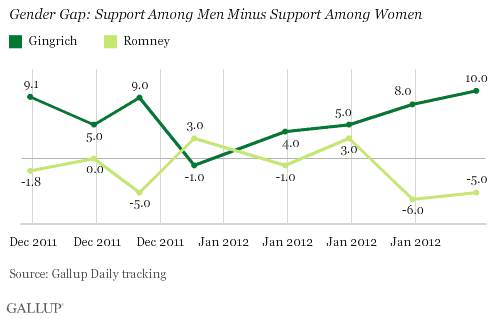You may have missed this, but Texas Congressman Ron Paul scores just about as well against Barack Obama in a general election match-up as does Mitt Romney. Both men do much better than Newt Gingrich or Rick Santorum against Obama.
Overall, among national registered voters in USA Today/Gallup's polling ending Jan. 28, it's Obama 48%, Romney 48%. And it's Obama 49%, Paul 46%. Not much of a difference at all. By contrast, Gingrich trails Obama 53%, 41%; and Santorum trails Obama 51%, 43%.
Let's dissect what's going on here.
First Romney and Paul both do equally as badly among Democrats, with Romney getting 9% of their support and Paul 12%. In other words, Obama swamps both among Democrats, as we would predict. No surprises there.
Among independents both Romney and Paul do about equally as well against Obama. Obama wins by four percentage points over Romney and by three points over Paul. Maybe this doesn't come as much of a surprise, since we know that Paul's libertarian, idiosyncratic policy positions and style may resonate with Americans who are less aligned with the traditional parties.
A somewhat bigger difference between these two men is evident among their native Republicans. Romney does better. Romney gets 90% of the vote of Republicans, while Paul gets only 80%. That's what mainly drives Romney's slightly better positioning against Obama than Paul's.
Paul's relative liability, in summary, is that he is not quite as attractive a candidate among the GOP as is Romney. Paul's relative strength, on the other hand, is the fact that he holds his own among independents, yielding nothing to Republican front-runner Mitt Romney.
So. If you just dropped in to planet Earth from Mars and spent time examining Gallup poll data -- certainly the first thing that a newly arrived Martian would want to do -- you would say that this person Mitt Romney and this person Ron Paul are doing about equally at this point in terms of match-ups against Barack Obama.
Most political observers would not give Paul much of a chance of beating Obama in November, in part because he isn't given much of a chance of winning the GOP nomination. In Gallup's daily tracking through Jan. 30, Romney receives 27% of the vote, Paul 13%. The betting market Intrade gives Paul about a 3% chance of being the nominee. Paul got only 7% of the Republican vote in the Jan. 31 Florida primary (although he did not campaign actively there).
Yet his appeal to voters relative to Romney's shows how structural the race is at this point. Many respondents to our polls when asked whom they are going to vote for in the general election are being guided by their party allegiances and traditional voting patterns. The actual candidates involved have some impact, but at this point more on the fringes. Apparently, Gingrich and Santorum have more negatives, or edges -- causing more independents to shy away from voting for them. Apparently, Paul doesn't share these negatives, or the edge he does have is actually appealing to some independent voters in particular. These things can and will change as the campaign progresses.
The Gender Gap in Support for Gingrich and Romney
One thing analysts noted after Tuesday night's Florida GOP primary was the gender gap. According to the Edison Research exit polls as reported by CNN, Mitt Romney beat Newt Gingrich among women by a 24-point margin, 52% to 28%, while Romney barely squeaked by among men by a five-point margin, 41% to 36%.
We have found the same thing in our daily tracking of the GOP race.
In the latest weekly compilation, Jan. 23-29, Gingrich had a 10-point male skew in support, while Romney had a 5-point female skew. That is, the gap between the percent of male Republicans who supported Gingrich in our tracking and the percent of female Republicans was 10 points. On the other hand, Romney got 5-points higher support among women than men.
This same pattern has occurred most, but not all, weeks since we began tracking.
To some degree this reflects the underlying ideological dynamics of the Republican Party. Strong Tea Party supporters went for Gingrich in Florida, and these tend to be more male in orientation. Of course, some may want to ascribe causality here to Gingrich's personal history, with his serial progression through three wives. That contrasts to Romney's 43-year marriage to one woman without any hints of impropriety. We don't have any data that allow us to measure directly the impact of these two candidates' personal lives on support among men and among women.

